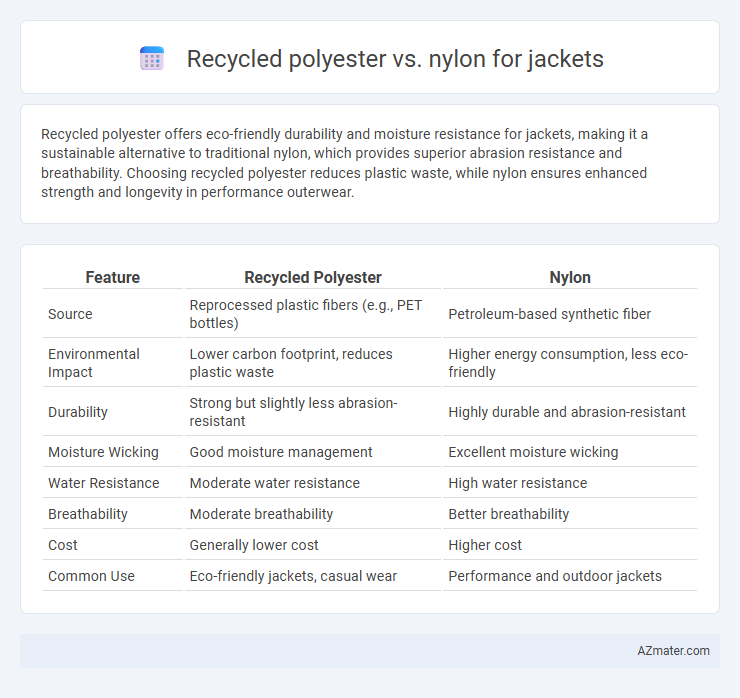Recycled polyester offers eco-friendly durability and moisture resistance for jackets, making it a sustainable alternative to traditional nylon, which provides superior abrasion resistance and breathability. Choosing recycled polyester reduces plastic waste, while nylon ensures enhanced strength and longevity in performance outerwear.
Table of Comparison
| Feature | Recycled Polyester | Nylon |
|---|---|---|
| Source | Reprocessed plastic fibers (e.g., PET bottles) | Petroleum-based synthetic fiber |
| Environmental Impact | Lower carbon footprint, reduces plastic waste | Higher energy consumption, less eco-friendly |
| Durability | Strong but slightly less abrasion-resistant | Highly durable and abrasion-resistant |
| Moisture Wicking | Good moisture management | Excellent moisture wicking |
| Water Resistance | Moderate water resistance | High water resistance |
| Breathability | Moderate breathability | Better breathability |
| Cost | Generally lower cost | Higher cost |
| Common Use | Eco-friendly jackets, casual wear | Performance and outdoor jackets |
Introduction: Recycled Polyester vs Nylon for Jackets
Recycled polyester and nylon are two popular materials used in jacket manufacturing, each offering distinct advantages in sustainability and performance. Recycled polyester is derived from post-consumer plastic bottles, reducing waste and energy consumption compared to virgin polyester. Nylon, often recycled from fishing nets or fabric scraps, provides high durability, abrasion resistance, and moisture-wicking properties, making it a preferred choice for outdoor jackets.
Material Overview: What Are Recycled Polyester and Nylon?
Recycled polyester is a sustainable fabric made from reprocessed plastic bottles and textile waste, reducing environmental impact by conserving resources and lowering carbon emissions. Nylon, a synthetic polymer derived from petrochemicals, offers high durability, elasticity, and resistance to abrasion, making it ideal for outerwear. Both materials are commonly used in jackets for their lightweight, water-resistant properties, but recycled polyester emphasizes eco-friendliness while nylon prioritizes strength and longevity.
Environmental Impact: Sustainability and Eco-Friendliness
Recycled polyester significantly reduces plastic waste by repurposing PET bottles, lowering reliance on virgin petroleum resources and decreasing greenhouse gas emissions compared to nylon production. Nylon manufacturing involves energy-intensive processes and releases nitrous oxide, a potent greenhouse gas, contributing to higher environmental impact. Choosing recycled polyester for jackets promotes sustainability and eco-friendliness by minimizing landfill waste and conserving non-renewable resources.
Durability and Performance Comparison
Recycled polyester jackets offer excellent durability with resistance to abrasion, UV rays, and moisture, making them ideal for outdoor activities and sustainable fashion. Nylon jackets excel in tensile strength, elasticity, and water resistance, providing superior performance in rugged conditions and high-stress environments. While both materials deliver strong durability, nylon typically outperforms recycled polyester in stretch and toughness, but recycled polyester leads in eco-friendly attributes without compromising functional performance.
Breathability and Comfort in Jackets
Recycled polyester offers excellent moisture-wicking properties and lightweight comfort, making it breathable and ideal for active wear jackets. Nylon, known for its durability and abrasion resistance, tends to be less breathable but provides a smooth, comfortable fit suitable for outdoor jackets. Choosing between recycled polyester and nylon depends on whether breathability or durability is the priority in jacket performance.
Water Resistance: Which Material Performs Better?
Recycled polyester jackets typically offer superior water resistance compared to nylon due to their hydrophobic properties and ability to repel moisture more effectively. Nylon, while durable and lightweight, tends to absorb more water, which can reduce its water-resistance over time unless treated with specialized coatings. For long-lasting water protection in jackets, recycled polyester is often the preferred choice, especially when enhanced with DWR (durable water repellent) finishes.
Insulation and Warmth Retention
Recycled polyester offers superior insulation and warmth retention for jackets due to its moisture-wicking properties and ability to trap heat effectively. Nylon, while durable and lightweight, tends to absorb more moisture, leading to reduced insulation efficiency in wet conditions. Choosing recycled polyester enhances warmth retention in cold and damp environments, making it ideal for insulated outerwear.
Cost Considerations: Price Comparison
Recycled polyester jackets generally cost less than nylon jackets due to lower production expenses and the use of post-consumer waste materials, making them a budget-friendly choice for eco-conscious consumers. Nylon jackets typically carry a higher price tag because of the cost-intensive manufacturing process and their superior durability and abrasion resistance. For consumers prioritizing cost-effectiveness without sacrificing performance, recycled polyester offers a widely accessible option with comparable functionality for everyday outerwear.
Style, Texture, and Aesthetics
Recycled polyester jackets offer a smooth, slightly shiny texture that enhances vibrant colors and modern, sleek styles, making them popular for eco-conscious fashion-forward looks. Nylon jackets provide a more matte finish with a crisp, structured feel, ideal for sporty, durable styles that emphasize functionality and classic aesthetics. Both materials allow for versatile design options, but recycled polyester leans towards sustainable fashion trends while nylon emphasizes performance and timeless appeal.
Final Verdict: Choosing the Best Material for Your Jacket
Recycled polyester offers superior environmental benefits with its reduced carbon footprint and water usage compared to nylon, while maintaining excellent durability and moisture-wicking properties ideal for jacket performance. Nylon provides greater abrasion resistance and elasticity, making it suitable for high-intensity outdoor activities requiring enhanced flexibility and toughness. Choosing the best material depends on prioritizing sustainability and lightweight comfort with recycled polyester or durability and stretch with nylon for jacket construction.

Infographic: Recycled polyester vs Nylon for Jacket
 azmater.com
azmater.com